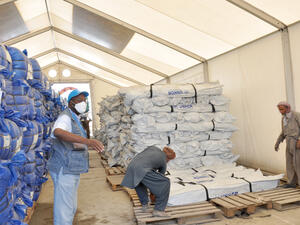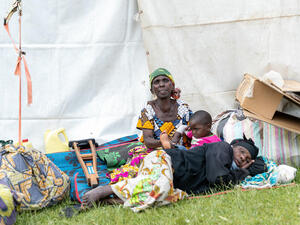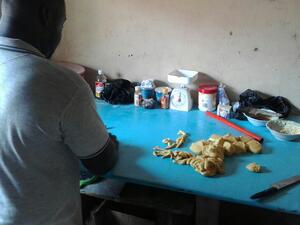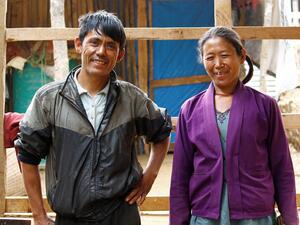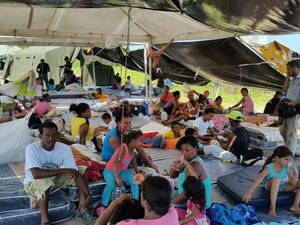Bittersweet Eid for Pakistan's quake survivors
Bittersweet Eid for Pakistan's quake survivors
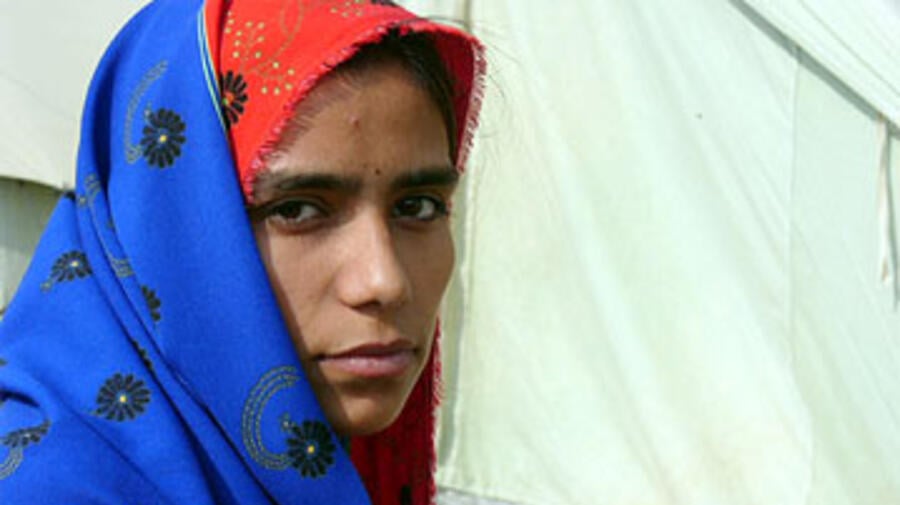
Tahira Mirhussain, a 22-year-old college student who spent her Eid in a UNHCR tent in Mera Yanolia, near Muzaffarabad.
BALAKOT, Pakistan, November 7 (UNHCR) - Every year, Tahira Gulafshan celebrates Eid el Fitr by cooking sheer khurma, a thick mix of milk, dried fruits and noodles, for her family in Quetta, south-western Pakistan. This sugary delicacy is eaten during "sweet Eid", which marks the end of the Muslim holy month of Ramadan. But this year, there is little to celebrate and nothing sweet to be savoured.
"I told my children: Mummy cannot spend Eid with you this year," said Gulafshan on the bumpy road to northern Pakistan. "There are many children without Mummies and many Mummies without children, so I am going to serve them."
Gulafshan is one of several UNHCR Pakistani staff who chose to forgo her three-day Eid holidays last weekend to rush relief and offer solace to the survivors of the October 8 earthquake.
"Before, Eid was a happy time. We made new clothes, bought shoes and cooked nice food. People came to visit us at home. But now, everything is finished, what is there to celebrate?" said Masihuzaman, an elder in Ghari Habibullah camp, one of 18 camps set up by the Pakistan military and UNHCR for people who lost their homes in the disaster.
Masihuzaman lost eight family members in Bagar Sharif village above the camp. Fellow villager Bibi Zoljohan wept, "My husband died and I have six children left. We are very sad, this is not our Eid."
Unlike Masihuzaman, Zoljohan does not live in Ghari Habibullah camp. She was merely visiting her children who stay with relatives at the camp. After Eid, she said she would make the day-long trek home up the stony mountain roads.
"I have some goats in the village, so I have to take care of them," she explained. "I sleep under some shade with some bedding. Even if a helicopter drops some aid, it's the strong people who will take it and run away. I'm all alone, no one takes care of me," she added, clinging to her youngest child, who played obliviously with a toy car he received the day before.
The military has tried to bring some festivities into the camp, stringing up decorations between tents and distributing balloons, toys and bangles to the children.
"For the last few nights, we've been organizing magic shows and competitions for the children. It's good to see the smiles back on their faces," said Captain Faisal at Ghari Habibullah camp. "We're focusing more on the young ones because they're the ones who most look forward to Eid. We're trying to bring some happiness to them."
But barely a month after the tragic earthquake, there's simply little to smile about. Sadia Abibi, 12, Babar, 10, and Aliya, four, lost their parents when their house in Gedah village collapsed. Their little brother Tofel, just one-and-a-half years old, is still lying injured in hospital.
The children are living with their relatives in the camp. Clad in festive new clothes and clutching new toys, they stared blankly when addressed. By day, the young orphans attend school in the camp. They play with their cousins in the afternoon and sleep with an aunt at night.
Their new clothes, toys and school are thanks to the generosity of the Pakistani people and international community.
It was a similar story across the mountains in Mera Yanolia, one of a string of camps near the shattered town of Muzaffarabad.
Shafik Ahmed is a government driver and was working at the opposite end of the country in Karachi when the earthquake brought the family home crashing down on his wife and children. Fortunately they were dug out by relatives, and the family spent this year's Eid el Fitr in a sombre mood in one of 700 UNHCR tents, sheltering a total of around 2,000 people, in Mera Yanolia.
"I rushed here as quickly as I could," said Ahmed. "Before the quake we used to have a very good Eid. On the first night we would go to the bazaar and buy things. We used to be very happy. We would go to neighbours' houses, pay our respects at the graves of our relatives and buy presents for our children. But this year we did nothing. So many of our relatives have died in the quake, there is nothing to celebrate. Everything we own is in the tent with us."
Tahira Mirhussain is a 22-year-old college student, who is also now calling a UNHCR tent in Mera Yanolia home. She is aware that she is one of the fortunate ones - despite the loss of almost everything they own, her immediate family members all survived the quake.
"This year we spent the Eid in a very plain manner," she says matter-of-factly. "In the morning we said our prayers, giving special thought to all those who died. We made some sweets and distributed them to families in the tents here. Now we need to rebuild the schools and colleges so I and others can complete our education. Rebuilding our lives will be more difficult."

Children in Ghari Habibullah camp were given toys and balloons for Eid.
The whole of Pakistan is still in shock at the catastrophe that struck the northern part of the country. Thousands of civilians spent the Eid el Fitr working alongside tens of thousands of soldiers and other government employees, as well as local and international aid workers to bring as much help to as many people as possible before the harsh Himalayan winter sets in and makes an already difficult situation even worse. The Eid weekend was marked by very muted celebrations, interspersed with a succession of dire warnings about increased incidence of respiratory diseases, such as pneumonia, and the desperate need for more funds.
"The idea behind fasting during Ramadan is to help us empathize with people who are less fortunate. We also give zakat, part of our savings, to the poor," said UNHCR's Gulafshan. "Eid is seen as a gift from God, and what better way to spend it than with people who need our help most?"
By Vivian Tan in Balakot, Pakistan
with Tim Irwin in Muzaffarabad


